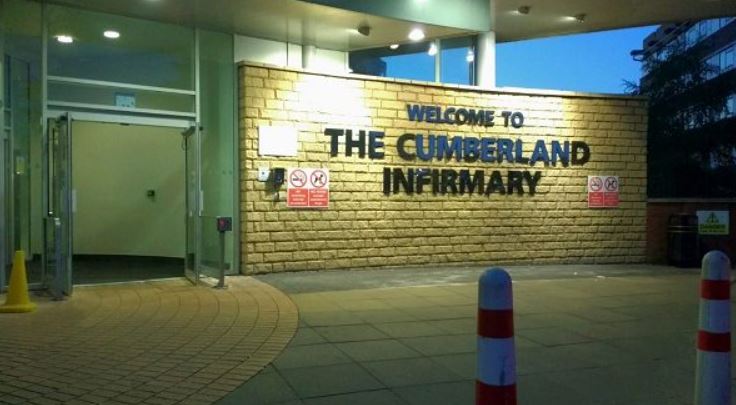
The NHS is under pressure in the wake of the coronavirus pandemic with health services across the country struggling to contain bloating waiting lists and facing growing demand for urgent care.
NHS figures show performance has deteriorated across England during the COVID crisis – patients are now waiting longer in A&E departments, for routine cancer treatment and for ambulances.
But how did these services look before the pandemic?
We’ve taken a look at how health service performance at the North Cumbria Integrated Care Trust – which runs the West Cumberland Hospital in Whitehaven, Carlisle’s Cumberland Infirmary and community hospitals – compares to three years ago.
Waiting lists
A record 6.6 million people were waiting for routine, consultant-led hospital treatment in England in May, NHS England figures show.
This included 34,466 waiting for care at North Cumbria Integrated Care NHS Foundation Trust – up from 28,677 last year and 3,049 in May 2019, before the pandemic.
NHS guidance says trusts should aim for 92 per cent of patients to be seen within 18 weeks, but this target has not been met nationally since 2016.
In May, just 64 per cent of patients who started treatment had been on the waiting list for less than 18 weeks, while more than 300,000 (five per cent) people started treatment after waiting for at least a year.
At the North Cumbria Integrated Care Trust, 64 per cent of the patients who began treatment in May had been waiting up to 18 weeks – down from 95 per cent before the pandemic.
In February, then Health Secretary Sajid Javid set out the post-COVID elective recovery plan for the NHS.
Mr Javid promised no patient will wait more than two years for treatment by July, but the Department for Health and Social Care admitted recently that this target has not been met.
A&E
NHS guidance states that 95 per cent of patients attending A&E should be admitted, transferred or discharged within four hours.
But NHS Digital figures show this target has not been met nationally since 2013, and in May, just 59 per cent of patients across England were seen within four hours – down from 76 per cent in the same month last year and 79% in 2019.
At the North Cumbria Integrated Care Trust, just 67 per cent of 9,070 A&E patients were dealt with within four hours.
NHS membership organisation NHS Providers said long waits in A&E were a symptom of massive pressure right across the health and care system.
Saffron Cordery, interim chief executive, said: “In urgent and emergency care especially, demand continues to outstrip capacity and services are under constant strain.
“We need a national urgent and emergency care strategy that looks at the many pressures beyond hospitals.”
Cancer treatment
The pandemic also had a significant impact on cancer services across England, with COVID-related disruption leaving many patients in limbo.
NHS guidance says 85 per cent of cancer patients with an urgent GP referral should begin treatment within 62 days.
Further NHS England figures show 46 out of 98 people referred for cancer treatment from their GP were treated within 62 days at the North Cumbria Integrated Care Trust.
Nationally, 61 per cent of people received treatment within 62 days in May – down from 78 per cent in 2019 and well below the 85 per cent target, which has not been met since December 2015.
Macmillan Cancer Support said the data showed the system was still under huge strain and urged the Government to prioritise the 10-year cancer plan to ensure the NHS was resourced to provide quality and timely cancer care.
Minesh Patel, head of policy, added: “It is a very turbulent time for cancer care and the wider NHS, and the current uncertainty in Westminster is deeply concerning.
“Cancer cannot wait for the chaos to subside.”
Ambulance response times
Ambulance trusts have also struggled with growing pressures as a result of the pandemic.
Nationally, the average response time for major emergencies has more than doubled in the last three years, sitting at 51 minutes and 38 seconds in June, NHS England figures show.
The figures show response times in the North West have also risen significantly throughout the pandemic.
In June 2019, ambulance teams at the North West Ambulance Service NHS Trust responded to major emergencies in 22 minutes and eight seconds.
This rose to 39 minutes and 46 seconds in the same month this year.
The Department of Health and Social Care said it was growing the workforce with 4,300 more doctors and 10,200 more nurses recruited than last year and has commissioned NHS England to develop a long-term workforce plan.
“NHS staff have been working incredibly hard to bust the COVID backlogs and have treated more than 15 million patients in the last year,” a spokesman said.
“Our community diagnostic centres have delivered over 1.5 million additional checks since July 2021, and the number of people waiting more than two years for treatment has dropped by more than 80 per cent since February.”
- What are your experiences of hospital services? Let us know – email [email protected]








